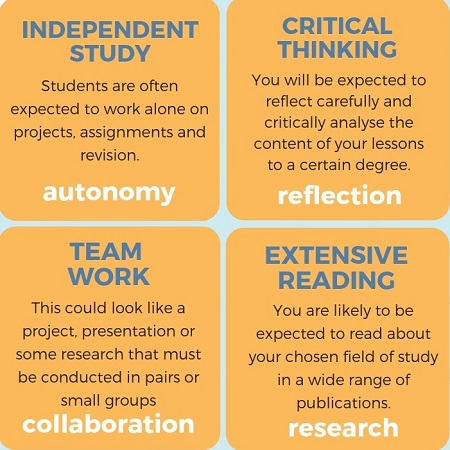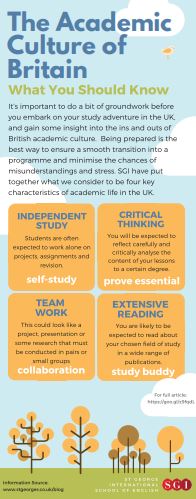If you’ve come to the UK to study, you may well experience some academic culture shock: the role of students and what is expected of them in terms of academic performance, behaviour and study skills might differ from that of what you’re used to. Not to mention the role of your teachers, the type of syllabus, study resources available, assessment procedures and social aspects of the academic world. For this reason, it’s important to do a bit of groundwork before you embark on your study adventure here, and gain some insight into the ins and outs of British academic culture. Being prepared is the best way to ensure a smooth transition into a programme and minimise the chances of misunderstandings and stress.
What you can expect, and indeed what is expected of you, will vary, of course, depending on your chosen subject, level of study and type of institution you will be attending. However, we have put together what we consider to be four key characteristics of academic life in the UK; these features are relevant whether you are going to be doing a Master’s or Bachelor’s degree at a British university or simply doing a vocational or language course in a local college or institute.

- Independent Study
Students are often expected to work alone on projects, assignments, and revision. In fact, a considerable amount of time may be devoted to independent study; if you are unsure about how to use this time effectively, make sure you speak to your tutor or a student welfare officer at your institution. Likewise, if the sheer amount of self-study is leading to loneliness or you feel you cannot cope, do seek help as early as possible. - Critical Thinking
There may be times when you are just required to memorise facts and figures and regurgitate them. In the majority of subjects, however, you will be expected to reflect carefully and critically analyse the content of your lessons or lectures, to a certain degree. Institutions should provide clear guidance on what they expect in this respect, since this is a skill that is often evaluated, especially at university level. - Team Work
While independent study is central to most courses, there is quite often an element of collaborative work: this could look like a project, presentation or some research that must be conducted in pairs or small groups. A group project might also form part of your assessment and is therefore not always optional. Your institution should give you guidelines on how to carry out the project together but don’t hesitate to approach them for clarification and guidance, especially if working with your peers is particularly challenging. - Extensive Reading
You are likely to be expected to read about your chosen field of study in a wide range of publications – and not just those on the compulsory reading list. Make sure you plan your time well in order to fit this reading in and perhaps ask a friend or classmate to be your ‘study buddy’; setting targets together and discussing this extended reading can be one source of motivation.
By. S.S.L
Download full infographic for this article

Study in the UK
SGI – St George International English School in London, with over 20 years of our highly successful University Foundation Course has meant we have built up excellent relationships with numerous universities who have accepted our students onto their degree programmes.

